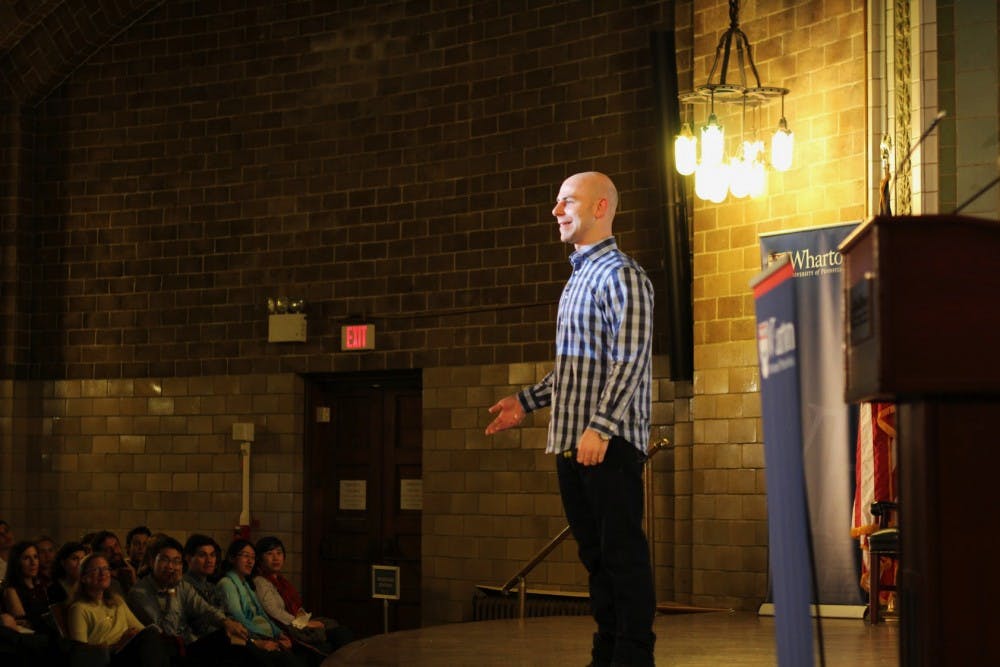
Wharton’s youngest tenured and highest-rated professor, Adam Grant, has been an outspoken critic of Penn’s cutthroat environment — but also teaches a class that is unusually competitive to even get into.
The irony has not been lost on Penn students. Although most do not blame Grant for the difficulty of getting into the class, some students say that there could be alternative ways of getting access to the class material.
The class, “MGMT 238: Organizational Behavior,” examines individual, interpersonal and group effectiveness at work. There is an extensive application process to gain admission to the course, and students were notified via email whether or not they had been accepted.
According to the email sent out to applicants, over 250 people applied for only 70 spots.
When students select courses on Penn InTouch, year is taken into account within the lottery system that is in place to determine schedules — older students have preference.
But seniority wasn’t the primary factor Grant used to select the class members of MGMT 238. In an email sent to the applicants who failed to gain admission to the course, Grant explained how he went about forming the class.
“After aggregating the assessments, the ultimate decisions were not a reflection of individual merit,” he wrote. “The goal was to create a class with diverse interests, experiences, and viewpoints.”
Grant did not respond to a request for comment.
Wharton sophomore Audrey Goldberg was among the 70 who were admitted to the class. She said that was she happy to be in the class, but wished it could be more accessible.
“I didn’t interpret this as competitiveness, but I do wish there were more sections so more kids would have the opportunity to take it,” she said.
Goldberg added that she liked how this application had unique writing prompts that left room for interpretation.
“It kind of reminded me of the college application process in that you don’t really know what they’re looking for, so you kind of just answer the best you can,” she said.
She also felt that the application process was more focused on picking a diverse class than on pitting students against each other.
Wharton senior Chris Hua agreed that there should be more sections of the class given the course’s high demand. He applied for the class in the fall but did not get in, and since he is a senior, he will never have the chance to take the class.
“It’s unreasonable for them to let everyone in, but it’s also surprising that he wouldn’t be willing to teach two sections of the class, especially when it’s clear there’s so much demand for it,” he said.
According to Hua, other popular classes in Wharton are more available to students who do not get into the course. He says in some courses, students can audit the class and watch lectures on Canvas even if they are not officially enrolled in the course — he wishes Grant’s class had options like that.
Wharton sophomore Jillian Li, who was accepted into MGMT 238, recognized that Grant’s class was very difficult to get into. But she believes that he is not to blame for the competitiveness that surrounded gaining admission to the course.
“He’s only one person,” she said. “In terms of the demand of his class, there’s only so much he can do in terms of accommodating every single person.”
A Wharton junior who was rejected from the class was frustrated after he did not get in, especially because of his genuine interest in the subject matter.
He said he wished to remain anonymous because he did not want to be disadvantaged when applying to join Grant's classes in the future.
“I was planning on concentrating in Management — I can’t even get into a Management class, and I’m a junior. Priority should be going to rising seniors ... like, I can’t even take a class in the concentration I want to pursue,” he said.
“It dawned on me afterwards that he [Grant] does talk a lot about how Penn has a very hyper-competitive culture ... but his class is impossible to get into.”
The Daily Pennsylvanian is an independent, student-run newspaper. Please consider making a donation to support the coverage that shapes the University. Your generosity ensures a future of strong journalism at Penn.
Donate




